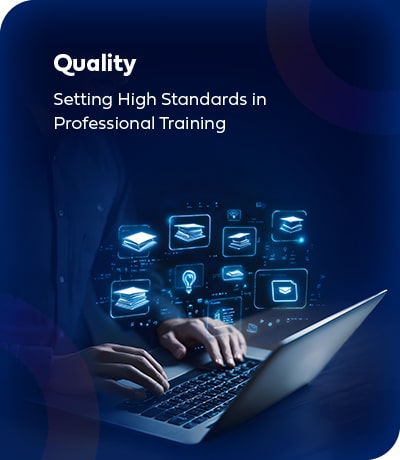
Course Package
Start learning immediately
1,085 Students enrolled
Price Match
Guarantee

3 months instalments of: £598.33
6 months instalments of: £299.17
9 months instalments of: £199.44
12 months instalments of: £149.58

Do you want to go from a complete beginner to a fully qualified accounting professional? With our AAT Levels 2, 3, & 4 in Accounting, you’ll gain the knowledge and practical skills to succeed in the industry. This qualification is suitable for all regardless of their industry background, so if you want to advance your accounting career, this AAT training course is for you!
This comprehensive AAT training package includes popular accounting qualifications such as the AAT Courses Level 2 Certificate in Accounting, AAT Level 3 Diploma in Accounting, and AAT Level 4 Professional Diploma in Accounting. It is your pathway to becoming a fully trained Licensed Accountant with AAT.
Across these three levels, you'll explore both fundamental and advanced accounting principles and techniques used today. From double-entry bookkeeping to handling taxes, evaluating financial performance, and managing budgets, you'll gain the skills needed to excel in accounting.
Upon completing your AAT Level 2 accounting qualification, doors open to roles such as Accounts Administrator, Payroll Administrator, or Sales & Purchase Ledger Clerk. After passing your AAT Level 3 exams, you can apply to become a Licensed Bookkeeper with AATQB status. Level 4 completion qualifies you to become a Licensed Accountant with MAAT status, paving the way for senior roles like Senior Bookkeeper, Senior Finance Officer, and Payroll Manager.
All the qualifications you'll earn in this AAT training package will be awarded by one of the industry's largest awarding bodies: the Association of Accounting Technicians (AAT). These certifications are trusted and respected by employers and businesses in the industry, making you an appealing candidate after earning these qualifications.
Our training package covers the full AAT course Levels 2, 3, and 4 2022 syllabus. It is delivered on our industry-leading eLearning platform, which contains study materials, live online classes, and dedicated support from experienced Tutors. The course also includes an official Sage certification and software.
In summary, this AAT Level 2, 3 & 4 Accounting course includes:
Access to a comprehensive eLearning platform with live online classes, digital resources and interactive course content.
Support from AAT's 'Tutor of the Year, 2024'.
Kaplan hard-copy textbooks.
Official Sage course included.
The ability to apply for AATQB and MAAT status.
Interest-free payment options.
Best price guaranteed on like-for-like online courses.
Join a community of learners and benefit from pass rates above the national average. (Level 2: 90%, Level 3: 76.1%, Level 4: 67.7%).
*Please note that the AAT membership fee and assessment fee are to be paid separately.
We're incredibly honoured to be recognised within our industry for our achievements as an AAT Training Provider, which includes:
Level 2
Unit 1: Introduction to Bookkeeping
This unit will teach you core accounting skills related to both manual and digital bookkeeping systems. You'll study the procedures and documents involved in these systems and delve deeper into the fundamental principles that govern double-entry bookkeeping systems.
Learning outcomes
Understand how to set up bookkeeping systems.
Process customer transactions.
Process supplier transactions.
Process receipts and payments.
Process transactions into the ledger accounts.
Unit 2: Principles of Bookkeeping Controls
Building upon the foundational knowledge gained in Unit 1, this module explores control accounts, journals and reconciliations.
Learning outcomes
Use control accounts.
Reconcile a bank statement with the cash book.
Use the journal.
Produce trial balances.
Unit 3: Principles of Costing
Through this unit, you will receive a comprehensive introduction to the principles of basic costing - skills that will assist you with more complex costing and management tasks that accounting technicians should know.
Learning outcomes
Understand the cost recording system within an organisation.
Use cost recording techniques.
Provide information on actual and budgeted costs and income.
Use tools and techniques to support cost calculations.
Unit 4: The Business Environment
Through this unit, you will acquire an in-depth understanding of key business concepts and their practical implementation in both internal and external environments. You'll also understand how organisations are structured and where finance functions play a part.
Learning outcomes
Understand the principles of contract law.
Understand the external business environment.
Understand the fundamental principles of corporate social responsibility (CSR), ethics and sustainability.
Understand the impact of setting up different types of business entities.
Understand the finance function within an organisation.
Produce work in appropriate formats and communicate effectively.
Understand the importance of information to business operations.
Level 3
Unit 1: Business Awareness
This unit is a foundational module that provides a comprehensive understanding of essential business concepts. It aims to equip individuals with the knowledge and skills necessary to comprehend the broader business context in which accounting functions operate.
Learning outcomes
Understand business structures.
Familiarise oneself with aligning businesses and accounts with the principles of professional ethics.
Effectively communicate information to stakeholders.
Comprehend the influence of external and internal environments on business performance and decision-making.
Acknowledge the implications of emerging technologies in accounting and the associated risks related to data security.
Unit 2: Financial Accounting: Preparing Financial Statements
Financial Accounting: Preparing Financial Statements aims to advance your expertise in financial reporting. This unit focuses on the principles and practices of preparing accurate and comprehensive financial statements, a critical aspect of effective financial management within organisations.
Learning outcomes
Prepare financial statements by accounting principles.
Understand the principles and techniques of financial accounting.
Grasp the principles of advanced double-entry bookkeeping.
Generate and extend the trial balance.
Prepare and document depreciation calculations.
Interpret financial statements using profitability ratios.
Prepare accounting records based on incomplete information.
Unit 3: Management Accounting Techniques
This unit aims to empower you with the practical knowledge and skills for effective management accounting. By the end of Unit 3, you will be proficient in employing various techniques to analyse, interpret, and present financial information that aids managerial decision-making processes. Applying these management accounting techniques contributes significantly to your overall AAT Level 3 Accounting qualification competency.
Learning outcomes
Demonstrate proficiency in the budgeting process.
Utilise variance analysis techniques for performance evaluation.
Explore various costing systems, including job costing and activity-based costing.
Apply decision-making tools like break-even analysis and relevant costing.
Implement performance measurement metrics for organisational efficiency.
Evaluate capital investment opportunities using financial appraisal techniques.
Develop skills in preparing and interpreting management reports.
Unit 4: Tax Processes for Businesses
Unit 4 explores the complicated landscape of business tax processes, offering a comprehensive understanding of the principles, regulations, and practical applications of AAT Level 3 qualification competency business taxation. This module equips you with the necessary knowledge and skills to navigate the complexities of tax processes, ensuring compliance and strategic decision-making within a business context.
Learning outcomes
Understand the principles of business taxation.
Identify the tax implications of different business structures.
Calculate and process Value Added Tax (VAT) for businesses.
Comply with tax regulations and reporting requirements.
Apply tax planning strategies for businesses.
Demonstrate proficiency in completing business tax returns.
Level 4
(3 mandatory units + 2 optional units)
Mandatory Unit 1: Applied Management Accounting
This unit will teach you how to construct budgets and report on areas of success and concern. You will also learn how to evaluate business performance critically.
Learning outcomes
Analyse and interpret financial data to assess the impact on organisational strategy.
Comprehend and execute the organisational planning process.
Employ internal processes for improved operational control.
Utilise techniques for informed short-term and long-term decision-making.
Analyse and present reports on business performance.
Analyse and recommend capital projects based on financial viability and strategic alignment.
Mandatory Unit 2: Drafting and Interpreting Financial Statements
In this unit, you'll learn how to draft financial statements for smaller companies and consolidate financial statements for larger companies, for which you will need international accounting knowledge. You will understand the frameworks that underpin the preparation of limited company financial statements.
Learning outcomes
Develop proficiency in drafting financial statements, including income statements, balance sheets, and cash flow statements.
Proficiently draft consolidated financial statements for groups of companies.
Understand the regulatory frameworks and accounting standards guiding financial statement preparation.
Develop the ability to interpret financial statements through ratio analysis, facilitating a comprehensive understanding of financial performance.
Mandatory Unit 3: Internal Accounting Systems and Controls
This unit teaches you about accountants' responsibilities and stakeholder reliance on accurate accounting reports. You'll learn how to mitigate accounting system weaknesses and apply analytical methods to evaluate how changes affect operational procedures.
Learning outcomes
Gain insight into the fundamental role and responsibilities of the accounting function within an organisation.
Understand the importance of robust internal controls in ensuring the integrity of financial information.
Acquire the ability to evaluate an organisation's accounting system and underlying procedures systematically.
Explore the influence of technology on modern accounting systems.
Apply analytical methods to assess the implications of changes to operating procedures.
Optional Unit 1: Business Tax
Business Tax explores the regulations and practices surrounding business taxation. You'll learn skills in handling business tax calculations, managing tax liabilities, complying with tax laws, and staying informed about changes in tax legislation.
Learning outcomes
Develop the ability to calculate business taxes for sole traders and partnerships accurately.
Acquire proficiency in preparing tax computations tailored to the unique characteristics of limited companies.
Gain insight into the tax implications of limited companies' sale of capital assets.
Familiarise yourself with the administrative intricacies of the UK's tax regime.
Develop an understanding of the tax considerations that arise when businesses undergo disposals.
Gain knowledge of available tax relief mechanisms and tax planning opportunities for businesses.
Optional Unit 2: Personal Tax
Personal Tax addresses income tax fundamentals, capital gains tax and inheritance tax. You'll learn how to calculate and file personal income tax returns and provide tax relief options to minimise tax obligations legally.
Learning outcomes
Develop a comprehensive understanding of the principles and rules that form the foundation of taxation systems.
Grasp the legal framework guiding taxation in the UK.
Understand the components contributing to the determination of total income.
Master the income tax calculation and National Insurance Contributions (NICs) payable by UK taxpayers.
Gain proficiency in calculating capital gains tax payable by UK taxpayers.
Understand the principles governing the taxation of capital gains.
Develop an appreciation for the principles underpinning the inheritance tax in the UK.
Optional Unit 3: Audit and Assurance
This unit looks into the principles and concepts essential to audit and assurance services, emphasising the role of professional ethics. It also highlights the significance of planning and risk assessment in guaranteeing the efficacy of audits while imparting skills to review and report audit findings proficiently.
Learning outcomes
Demonstrate a comprehensive understanding of the principles and concepts underpinning audit and assurance services.
Highlight the importance of professional ethics in the context of audit and assurance services.
Understand the significance of effective planning and risk assessment in ensuring the success of an audit.
Acquire skills in reviewing and reporting findings from the audit process.
Optional Unit 4: Cash and Financial Management
This unit develops skills to forecast cash flows with precision. It also explores strategies for monitoring and controlling cash flows, ensuring financial management for organisational well-being, and examining different avenues for securing financial resources.
Learning outcomes
Develop the ability to forecast cash receipts and payments accurately.
Acquire skills in preparing comprehensive cash budgets.
Learn effective methods for monitoring and managing cash flows within an organisation.
Understand the implications of effective financial management on the overall health of an organisation.
Explore various methods of raising finance for organisational needs.
Optional Unit 5: Credit and Debt Management
This unit teaches how to set up effective credit control systems, such as properly managing debts. Students will learn methods for checking the risks of giving credit, following laws, and practising ethical accounting.
Learning outcomes
Gain insights into the relevant legislation and contract law influencing the credit control environment.
Learn how information is utilised to assess credit risk and make informed decisions on granting credit.
Explore various techniques available for collecting debts.
Comply with organisational policies and procedures in the credit assessment process.
Develop an understanding of the systematic approaches to credit control within an organisational context.
Format
AAT Level 2 Certificate in Accounting has three objective-type tests and one synoptic assessment. AAT Level 3 Diploma in Accounting has four objective-type tests you must pass before earning the qualification. Meanwhile, the AAT Level 4 Diploma in Professional Accounting has three objective-type tests from mandatory units and two objective tests from optional units.
The objective tests are computer-based and assess all component learning outcomes you have covered in the unit. Meanwhile, the synoptic assessment is also a computer-based format that assesses your knowledge across all units.
Duration
Below are the duration for each exam in AAT Level 2:
Introduction to Bookkeeping: 90 mins.
Principles of Bookkeeping Controls: 90 mins.
Principles of Costing: 90 mins.
The Business Environment: 120 mins.
Here are the exam durations for AAT assessments in AAT Level 3:
Business Awareness: 150 mins.
Financial Accounting: Preparing Financial Statements: 150 mins.
Management Accounting Techniques: 150 mins.
Tax Processes for Businesses: 90 mins.
Here are the exam durations for the mandatory units in AAT Level 4:
Mandatory Unit 1- Applied Management Accounting: 150 mins.
Mandatory Unit 2- Drafting and interpreting Financial Statements: 150 mins.
Mandatory Unit 3- Internal Accounting Systems and Controls: 150 mins.
Here are the exam durations for the optional units in AAT Level 4
Optional Unit 1- Business Tax: 150 mins.
Optional Unit 2- Personal Tax: 150 mins.
Optional Unit 3- Audit and Assurance: 150 mins.
Optional Unit 4- Cash and Financial Management: 120 mins.
Optional Unit 5- Credit and Debt Management: 120 mins.
Availability
All AAT exams from these levels can be taken at AAT testing centres. We'll provide you with all the support and resources you need to prepare for your exams.
You must become an AAT member to sit your AAT assessments. AAT student membership and exam fees are separate from the course price.
Objective tests are computer-marked, so you'll receive your results within 48 hours via MyAAT. The synoptic assessment is human-marked, so you'll receive the results within six weeks of the last day of the synoptic window.
Course Level
Level 2, 3 & 4
SCQF Level 6, 7 & 8 in Scotland
GCSE (Grades 4–9), A Level/AS Level and 1st Year of Bachelors
GCSE (Grades A*–C), A Level/AS Level and 1st Year of Bachelors
Anyone can enrol in this AAT training package, which is perfect for those looking to start a career in accounting and those with little to no industry experience.
You will be required to:
Be at least 16 years old (or have the consent of a parent or guardian)
Have a solid understanding of the English language
Be comfortable with basic mathematics
Have access to a PC or Laptop (This course is both Mac and Windows compatible)
While this AAT qualification package is delivered online, we also include the textbooks to assist you with your studies.
Comprehensive Training: Enjoy a comprehensive education with eLearning, live classes, books, and dedicated tutor support tailored just for you.
Best Price Guarantee: We assure you that you're getting the most cost-effective training solution in the UK.
High-Quality Training: Access high-quality materials and methodologies, such as interactive eLearning modules, comprehensive study guides, and real-world case studies, to ensure a superior learning experience.
High Pass Rates: Join a thriving community of candidates like yourself, benefiting from our high pass rates.
Exceptional Tutor Support: Receive fantastic guidance and assistance from our dedicated tutors, ensuring your success.
Leading AAT Training Provider: Choose to learn from one of the largest AAT training providers in the country and take advantage of our expertise.
Trusted and Credible Provider: Trust in positive Trustpilot scores, reflecting our reputation as a trusted and credible training provider focused on your success.
Interest-Free Finance Options: Make your education more accessible with our interest-free finance options, eliminating immediate financial strain from your learning journey.
Advanced your accounting career and boost your earning potential: Gain recognised AAT qualifications that can unlock job roles and boost your income.
What is AAT Level 2, 3, & 4 equivalent to?
AAT Level 2 is equivalent to GCSE Grades 4-9 (A*-C) in the UK education system and to Level 2 in the Regulated Qualifications Framework (RQF). In Scotland, it is equivalent to SCQF Level 6. AAT Level 2 is not equivalent to a bachelor's degree.
Meanwhile, AAT Level 3 is equivalent to A Levels in the UK education system. In Scotland, it is equivalent to SCQF Level 7. Level 4 AAT courses are equivalent to the first year of a Bachelor's degree in England.
Are you an Accountant after AAT Level 2?
Passing AAT Level 2 does not make you a fully qualified accountant. This is just the beginning of your accounting qualification journey.
To become a qualified accountant, you typically need to complete a higher level of AAT accounting qualifications, such as AAT Level 3, AAT Level 4, or even CIMA Professional Qualification.
What is the highest level of AAT?
The highest level of AAT is the Level 4 Diploma in Professional Accounting. Upon completing the qualifications, you can apply for the full AAT membership and use the qualifications as an entry route to higher-level accounting qualifications.
Are you a qualified Accountant with AAT Level 4?
Studying and passing AAT Level 4 makes you a qualified Accountant. You can apply for full AAT membership (MAAT) and use the designatory letters after your name. You can also apply for full licenced accountant status and run your own accounting practice.
How long does it take to complete AAT Levels 2, 3, and 4?
Completing the AAT Levels 2, 3, & 4 in Bookkeeping depends on various factors, such as the preferred learning style, prior knowledge in the industry, and the amount of time you can dedicate to studying each week. You'll gain 12 months of access to the AAT Level 2 course, 15 months of access to the Level 3 course, and 18 months of access to the AAT Level 4 course, so you can study at your own pace.
On average, our students typically complete their AAT Level 2 within 6 to 9 months, while it takes them 9 to 12 months to complete the AAT Level 3. Students typically finish their AAT Level 4 within 12 to 15 months.
What jobs can I pursue after completing the accounting and finance qualifications?
Whatever your career goals, upon completing AAT Level 2, 3, & 4 Accounting, you can access various career opportunities in finance and accounting. Each role offers unique responsibilities and challenges, providing opportunities for professional growth and advancement within the finance and accounting sector. Some of the job roles you can pursue include:
Accounts Payable Clerk
Accounts payable clerks focus on managing and processing payments to suppliers, ensuring accurate and timely financial transactions within an organisation.
Finance Assistant
As a finance assistant, you'll support an organisation's financial activities, including bookkeeping, invoicing, and financial reporting tasks.
Assistant Financial Accountant: Assists in preparing and maintaining financial records, supporting the financial accounting function of a business and ensuring businesses operate within the audit and assurance framework.
Commercial Analyst: Analyses financial data to provide insights and recommendations for business strategy and decision-making.
Cost Accountant: This position focuses on tracking and analysing costs within a company, helping to optimise spending, improve financial efficiency, and provide statutory financial statements.
Fixed-asset accountant: This person manages and maintains records related to fixed assets, ensuring accurate accounting for property, equipment, and other long-term assets and helping with an organisation's credit control processes.
Indirect Tax Manager: Specialises in managing and overseeing indirect taxes and ensuring compliance with relevant tax regulations.
Payroll Manager: Manages the payroll function, ensuring accurate and timely processing of employee salaries and related payments.
Payments and Billing Manager: Oversees payment processes and billing functions, ensuring accuracy and efficiency in financial transactions.
Senior Finance Officer: Assumes a senior position in the finance department, contributing to financial planning, analysis, and reporting.
Senior Fund Accountant: Manages and oversees accounting activities related to investment funds, ensuring accurate financial reporting.
Senior Insolvency Administrator: Specialises in handling insolvency cases and managing the administrative processes during liquidation or bankruptcy.
Tax Supervisor: Supervises tax-related activities, ensuring compliance with tax laws and regulations.
VAT Accountant: Specialises in value-added tax (VAT) matters, ensuring accurate reporting and compliance with VAT regulations.







